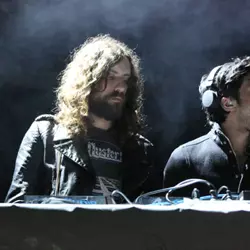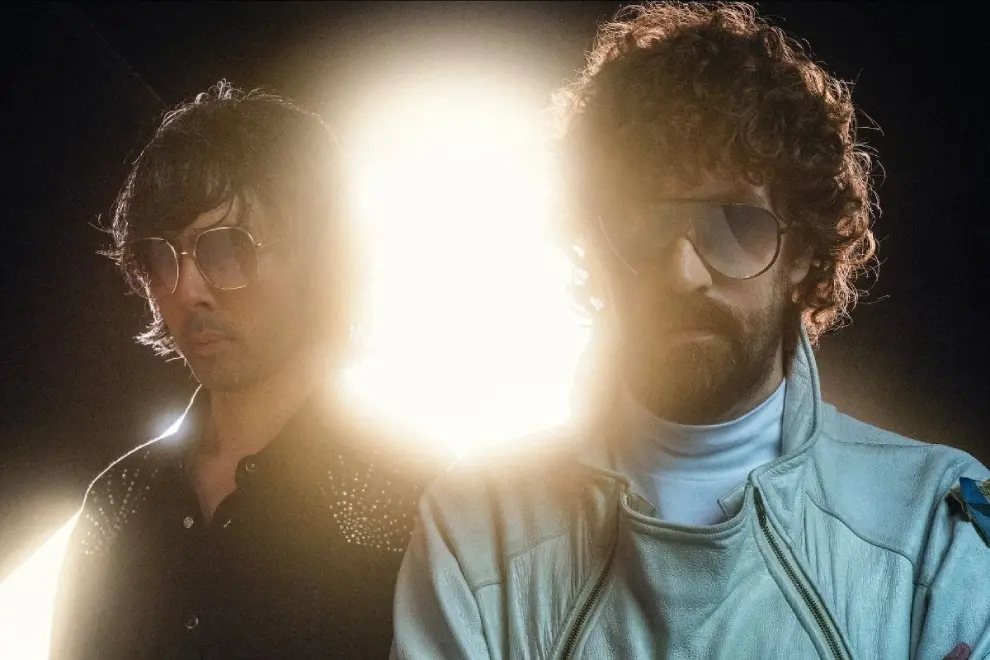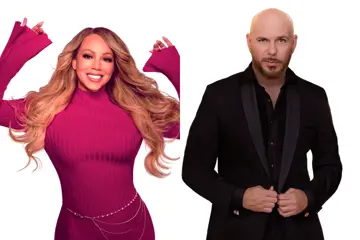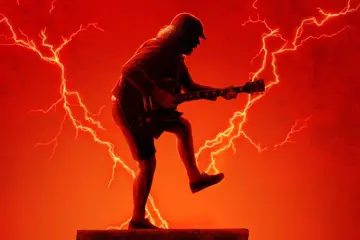 Justice
JusticeThe mythic French electro-punks Justice have delivered their first album in seven years – and the all-star Hyperdrama, which even sees them collaborate with Tame Impala's Kevin Parker on the shapeshifting lead single One Night/All Night, might be their most ambitious. But don't imagine that Justice's Gaspard Augé and Xavier de Rosnay will now court pop ubiquity Daft Punk-style. They're too singular.
"Making pop records – like proper pop records – requires a talent that we may not have," de Rosnay says. "It's almost like a science. To make music in a form that everyone can understand, including all types of audiences, including kids – I'm not sure we're able to do that."
De Rosnay and Augé are conducting what is, at least for Australian media, a rare interview together over Zoom. The Parisians convey Gallic swagger, sporting denim shirts and stylishly oversized glasses – Augé beardy and de Rosnay all bouffant hair. Augé's connection falters at one point, a patient de Rosnay assuring, "I'm still here if you want to move forward," from a cosy attic space. They will soon rock Coachella, previewing Hyperdrama with a new live show the same day Lana Del Rey headlines.
Graphic design kids, Justice broke out as a cult act with 2003's remix of Simian's Never Be Alone (dubbed We Are Your Friends), Daft Punk's astute manager Pedro Winter signing them to his Ed Banger Records. They subverted 'French touch' aesthetics – their mode, exemplified by 2005's banger Waters Of Nazareth, ravey, discordant and weird. Indeed, Justice's "noise" presaged EDM and permeated Kanye West's Yeezus.
In 2007 the mavericks unleashed a debut album, known as Cross, their imagery a mash-up of Christian and heavy metal iconography (they recently accused Justin Bieber of copying their logo for his Justice cover). Still, the funky hit D.A.N.C.E. had the fidelity of vintage Jackson 5.
Justice followed with Audio, Video, Disco, abandoning electro-noise for prog-rock. After a hiatus, the duo presented 2016's decadently romantic Woman—a sonic homage to Cerrone's sumptuous disco with orchestral and choral arrangements. Justice last issued Woman Worldwide, an unusual hybrid live remix LP, picking up the Grammy for "Best Dance/Electronic Album" (they previously won a Grammy with a remix of MGMT's Electric Feel).
Unexpectedly, Augé rolled out a solo LP, Escapades, in 2021. "It was very healthy to get some stuff out of my system, in terms of little obsessions and stuff that I wanted to put out," he reveals, his voice deep. "So, when we started with Xavier, we started a bit fresh and with new energies and new motivations, which was good for the [Hyperdrama] project, I think."
Hyperdrama is surely Justice's most multi-faceted and substantial album. It could be their counterpart to Daft Punk's Random Access Memories, the combo accompanied by buzz guests – Parker, Miguel, Thundercat and Kiwi eccentric Connan Mockasin – plus newcomers such as RIMON, a Dutch R&B singer, and Mancunian indie twins The Flints. Yet Justice are too perverse for that. Thematically, Hyperdrama catches them revelling in dichotomy and incongruity. They switch between disco and techno, often within the same track – lurching into the historically polarising gabber on Generator.
Curiously, de Rosnay says that, while protracted, the Hyperdrama sessions were "easy" – the pair advancing through the various stages, from writing to production to mixing. "We really took the time to make things. We spent roughly three-and-a-half years working on it, but it was three-and-a-half years of constant progression. There was not any point where we were stuck or something. So it was a long process… At the same time, it was almost unhealthy and obsessive. But we were really working on the details, working on putting things together at each stage of the record."
Justice cut "dozens, sometimes hundreds, of versions of the same track" until they were satisfied "because we felt that there was something that we loved in the demo that we quite didn't have in the final version," he states. "We were working on something very meticulous."
Justice maintain that completing Hyperdrama was more challenging than even the maximalist Woman. In that case, "once it was done, it was done," says de Rosnay. "We also wanted Woman to sound a bit raw, in the sense of not over-produced." By contrast, their aim with Hyperdrama was that it sound "together". "It's sometimes very difficult on Hyperdrama to really understand what is playing what; what are instruments, what are samples… At least, we tried to make everything sound like it's just one big texture, and it's taking over the whole record."
Typically, Justice record autonomously – although Zoot Woman's Johnny Blake was a vocalist on Woman. But, for Hyperdrama, they embraced collaboration. The proviso was anyone always meet in person. "It was great because it's almost like being in these kind of nerdy music documentaries, when you look at people working behind the scenes," de Rosnay enthuses. "You take a peek at how all these people are working. They all have their idiosyncrasies; they all have their own ways of proceeding and making things that are very different. It was really fun and insightful to witness."
Songwriting is tricky for the instrumentalists. "Obviously, we are not too big on lyrics because it's a struggle for us to find something simple and efficient," Augé admits. Justice have a vibe. "We always like to stay in the realm of meaningful, but not too meaningful, and vague, but not too vague."
That Justice should connect with the ever-versatile Parker on two songs is no surprise, given they're longtime associates. In fact, Justice have consistently championed Australian musicians, Augé referring to Midnight Juggernauts as "our favourite band for many years."
De Rosnay recalls Justice's early "intuition" that Parker was "an amazing musician." "We really understood he was next level when we first heard Elephant – because, before [2012's album] Lonerism was out, we received Elephant via his label asking for a remix.
"That was the moment where we were like, 'Okay, we used to like Tame Impala, now we understand that it's gonna be a huge band and what [Parker is] doing is really more than what we thought." As such, they declined the remix. "We wrote back to the label saying, 'Listen, the song is perfect; whatever we'll do to it is gonna make it less good.'"
Though Justice and Tame Impala are "very different musically," de Rosnay holds they share "a common ground." The Frenchmen caught up with Parker in Los Angeles, sharing their demos – among them what evolved into the groovy opener Neverender, "a good match for him."
Justice intentionally didn't suggest Parker feature on Neverender specifically. "We didn't want to drive him too much towards our choice," de Rosnay continues. When Parker learned that they had Neverender in mind, he demurred "because to him it sounded too natural and too predictable," only to eventually concede. Notably, Justice readily persuaded Parker to croon "I can be your woman" on the One Night/All Night.
There's a view that artists become conservative with age – like the late Prince, whom Miguel channels on the metallic funk Saturnine. But, while their trajectory is hurling them into ever-more musical territory, Justice have retained that transgressiveness – Muscle Memory a spooky mini-score. "We don't really cultivate it," de Rosnay divulges. As consumers, Justice do occasionally "love easy entertainment," but they're drawn to the peculiar.
"We will always feel more attracted to things that have a real proposition, and also that kind of unsettles you," de Rosnay muses. "If one day you come to my house, you will see that I have a soft spot for paintings and furnitures that have something a bit broken or that have something that feels just a bit strange or off or unsettling. And that goes for music, of course. We can't help but put all of this in every track we make and every album we make. For us, it gives a lot of dynamic and amplitude."
Justice enjoy ruminating on Prince's indulgences. "When you know too much about music, [or] about recording, you get a bit seduced by, 'Okay, I have to make the best-sounding record; I have to have thousands of layers of music,'" Augé ponders. "But we've never really been concerned with that. We're trying to, as much as we can, keep a fresh perspective on what we're doing.
"As we grow older, it could be easy to go to the easiest stuff. But, to us, it's the opposite. The more we listen to [music], the more we are looking at art, we're always trying to find something that we haven't listened to before or seen before – just because it's more fun and more unsettling.
"For example, on Hyperdrama, we have this kind of jazzy interlude [Moonlight Rendez-Vous], which was something that was definitely out of our comfort zone, but it was really fun to make. I think it's Xavier's favourite track on the record."
De Rosnay questions whether Prince's later activity was conventional. "Prince started [doing] straight-forward pop music, and then he went bonkers." He suppresses a laugh. "Actually, at the end, when you were going to see a live show of Prince, you would never know if he would have the hits or if he would have three hours of him playing free jazz guitar solos."
Justice are perceived as a unit, Escapades aside. If the enigmatic duo have their idiosyncrasies, they aren't identifying them. "I guess we always wanted our music to be bigger than our personalities," Augé illuminates. "We always love music that is just larger than life. And, when it comes to explaining music, it's always ruining a bit of the magic because, in the end, it's just the two of us sitting in front of a computer most of the time. But, yeah, we don't really want to make music that sounds like how it's made."
Do Justice argue? "We do, but always in a healthy way," de Rosnay responds. "It's very important to disagree because this is what pushes the whole project forward. But we don't disagree on the core issues – like the core of Justice. We have the same vision of where it needs to go and what it has to be, and then we can disagree on details – but details are very important."
Again, they'll labour on a track "until we get it right," he says. "I can't think of something that was less good after we disagreed and enhanced it. We keep on disagreeing sometimes even for the sake of just making things better – because we feel what's quite not there yet."
Four albums in and Justice are still disrupters. Will they emulate Daft Punk, who teamed with The Weeknd on Starboy, and rebrand as pop super-producers? "It depends," de Rosnay begins.
Justice would need to be passionate about an act to produce them. Above all, "Justice always comes first," de Rosnay stresses. "If we're finishing an album, we don't do anything else."
Nor are Justice pursuing soundtracks despite their interest in film – having released concert films like 2019's IRIS: A Space Opera.
Justice have had opportunities – and Augé contributed to Mr Oizo's horror comedy Rubber. But, he says, they're awaiting "the right project."
Augé is discerning about soundtracks in general, expressing disdain for the contemporary "Hans Zimmer-type." "They always sound like they're forcing you to feel something – [with] all those very syrupy strings and stuff. This is something I really don't like when I'm watching a movie."
Besides, De Rosnay is wary of scoring a film with "electronic disco music," adding "that would probably not be a good thing."
At any rate, Justice are reluctant to create under constraints, he reasons. "We definitely don't feel like spending three years of our lives working on a blockbuster movie – which sounds to us like it's mainly struggling with the producers, and the studios, to end up making something that is very generic." Nevertheless, they'd welcome a call from recent Oscar winner Jonathan Glazer.
Next Justice will join the European festival circuit over the summer. The old Aussie faves last hit these shores in 2018, heading Sydney City Limits. Is there the prospect of a return? "We would love to!" de Rosnay says, "We had so much fun every time we came to Australia." Alas, "logistics" are the dilemma. "It's very, very difficult to make it to Australia live because that means shipping the equivalent of three trucks on the plane to the other side of the world where we can play maximum, like, five or six shows."
He doesn't want to disappoint, however. "We're trying, and we really want to, but we're just pushing squares into circles to make it happen. But it will, I'm sure – pretty sure."
Hyperdrama is out now via Ed Banger Records.






